#aws devops professional
Explore tagged Tumblr posts
Text
Hire Experience Fitness Mobile App Development | BCoder Castle
Empower fitness enthusiasts with a cutting-edge fitness mobile app. From workout tracking and nutrition planning to virtual coaching, our fitness mobile app development transforms health and wellness experiences, promoting a healthier lifestyle. For further details contact us at +1 (561)603-5184

0 notes
Text

DevOps Software Solutions | AllCode
Streamline your development lifecycle with top-tier DevOps software solutions designed to accelerate collaboration, automate workflows, and enhance deployment efficiency. Whether you're scaling cloud environments, optimizing CI/CD pipelines, or ensuring seamless integration between development and operations, these solutions empower businesses to innovate faster and deliver high-quality applications. Embrace the future of agile development and operational excellence with tools tailored to your unique needs. Start transforming your software delivery process today!
#software developer consultant#mobile app development#devops professional services#aws advanced consulting partner
0 notes
Text

Optimize your workflow with leading DevOps services! 🚀 Our solutions provide seamless continuous integration and automated deployments to boost your productivity. 💼🔧 Learn how we can help streamline your operations.
#Hire DevOps Developers#Hire DevOps Engineer#Hire Dedicated DevOps Developers#Hire DevOps Specialist#DevOps Services and Solutions#DevOps Consulting Company#Best DevOps Consulting Company#DevOps Services#DevOps Consulting Services#DevOps Professional Services#DevOps Automation Services#DevOps Automation Services and Solutions#AWS Certified Devops Engineer#Devops Companies#AWS Devops Engineer
0 notes
Text
Prepare for the AWS Certified DevOps Engineer Professional Mock Test in Pune
Preparing for the AWS Certified DevOps Engineer Professional mock test in Pune can be a challenging yet rewarding endeavor. As you gear up to take the test, it's important to have a well-rounded preparation strategy that covers all the essential aspects of the exam.

0 notes
Text
Are you looking for the best IT professionals in Cloud Engineering?
Cloud Engineers are IT professionals who design, develop, modify, and manage cloud-based systems. Cloud Engineers from Techno Kryon are ready to serve your organizational needs as our engineers are experts in handling the cloud and finding solutions to your needs. Work of cloud engineers: 1. Designs the Cloud 2. Develops and maintains the cloud 3. Introduce modular cloud-based systems 4. Guaranteeing effective data storage 5. Maintain security and respect the security guidelines 6. Support cloud as per the requirements of the clients
Cloud engineers are responsible for building up secure cloud management. Techno Kryon’s cloud engineers often review their existing system and try to modify it with improved technologies to make it more secure and maintain its standard position in the cloud. Cloud engineer's main role is to recognize, assess, and fix infrastructure weaknesses and application deployment problems. How to become a Cloud Engineering expert? • Completing certifications in Azure, AWS, and GCP • Must have work experience as a Cloud Engineer or in any related positions. • Must be strong in communication skills • Feel free to work with other teams of experts • Must have training in Cloud Engineering Techno Kryon and Cloud Engineering Techno Kryon is one of the leading software company in Chennai who has come across various projects in different sectors and different countries proving the stability of our engineers. Cloud Engineering is one of the most important parts of information technology where the data are created, stored, and retrieved securely based on the needs of clients. Cloud engineers from Techno Kryon have vast knowledge in Cloud Engineering as we completed 100+ projects in different countries such as India, Canada, USA, Australia, Singapore, and UAE. They had nearly 7+ years of experience in handling cloud data. We support the system with high-security maintenance and maintain its speed and stability. Our developers often review and update new technologies for the improvement of cloud management. Why choose Techno Kryon? • We provide assured and highly performing services maintain and valuate the speed periodically • Maintain highly secured performance services at a valuable cost • We have experts to provide instant solutions • Responsible and trustworthy engineers • Deliver services before the time of delivery
Hire Cloud Engineers from us to get trustworthy services. We are ready to Hire developers from Dubai, India, Australia, USA, Canada, and UAE as we have experienced experts to give solutions for your needs. We support you to get valuable services on time that could compete beyond your thoughts.

For more details
Visit us: www.technokryon.com
Call us on: IND: +91 73586 15097
US: +1(201) 822-9121
Mail us: [email protected]
#hire AWS developer#hire top remote AWS developers#hire AWS developers from India#hire remote developers#hire AWS experts#hire AWS experts in Chennai#hire AWS experts in India#hire AWS developers in Chennai#professional cloud DevOps engineer#hire Google Cloud developer in Chennai
0 notes
Text
Build the Future of Tech: Enroll in the Leading DevOps Course Online Today
In a global economy where speed, security, and scalability are parameters of success, DevOps has emerged as the pulsating core of contemporary IT operations. Businesses are not recruiting either developers or sysadmins anymore—employers need DevOps individuals who can seamlessly integrate both worlds.
If you're willing to accelerate your career and become irreplaceable in the tech world, then now is the ideal time to sign up for Devops Course Online. And ReferMe Group's AWS DevOps Course is the one to take you there—quicker.

Why DevOps? Why Now?
The need for DevOps professionals is growing like crazy. As per current industry reports, job titles such as DevOps Engineer, Cloud Architect, and Site Reliability Engineer are among the best-paying and safest careers in technology today.
Why? Because DevOps helps businesses to:
Deploy faster using continuous integration and delivery (CI/CD)
Boost reliability and uptime
Automate everything-from infrastructure to testing
Scale apps with ease on cloud platforms like AWS
And individuals who develop these skills are rapidly becoming the pillars of today's tech teams.
Why Learn a DevOps Online?
Learning DevOps online provides more than convenience—it provides liberation. As a full-time professional, student, or career changer, online learning allows you:
✅ To learn at your own pace
✅ To access world-class instructors anywhere
✅ To develop real-world, project-based skills
✅ To prepare for globally recognized certifications
✅ J To join a growing network of DevOps learners and mentors
It’s professional-grade training—without the classroom limitations.
What Makes ReferMe Group’s DevOps Course Stand Out?
The AWS DevOps Course from ReferMe Group isn’t just a course—it’s a career accelerator. Here's what sets it apart:
Hands-On Labs & Projects: You’ll work on live AWS environments and build end-to-end DevOps pipelines using tools like Jenkins, Docker, Terraform, Git, Kubernetes, and more.
Training from Experts: Learn from experienced industry experts who have used DevOps at scale.
Resume-Reinforcing Certifications: Train to clear AWS and DevOps certification exams confidently.
Career Guidance: From resume creation to interview preparation, we prepare you for jobs, not course completion.
Lifetime Access: Come back to the content anytime with future upgrades covered.
Who Should Take This Course?
This DevOps course is ideal for:
Software Developers looking to move into deployment and automation
IT Professionals who want to upskill in cloud infrastructure
System Admins transitioning to new-age DevOps careers
Career changers entering the high-demand cloud and DevOps space
Students and recent graduates seeking a future-proof skill set
No experience in DevOps? No worries. We take you from the basics to advanced tools.
Final Thoughts: Your DevOps Journey Starts Here
As businesses continue to move to the cloud and automate their pipelines, DevOps engineers are no longer a nicety—they're a necessity. Investing in a high-quality DevOps course online provides you with the skills, certification, and confidence to compete and succeed in today's tech industry.
Start building your future today.
Join ReferMe Group's AWS DevOps Course today and become the architect of tomorrow's technology.
2 notes
·
View notes
Text
Top 10 In- Demand Tech Jobs in 2025

Technology is growing faster than ever, and so is the need for skilled professionals in the field. From artificial intelligence to cloud computing, businesses are looking for experts who can keep up with the latest advancements. These tech jobs not only pay well but also offer great career growth and exciting challenges.
In this blog, we’ll look at the top 10 tech jobs that are in high demand today. Whether you’re starting your career or thinking of learning new skills, these jobs can help you plan a bright future in the tech world.
1. AI and Machine Learning Specialists
Artificial Intelligence (AI) and Machine Learning are changing the game by helping machines learn and improve on their own without needing step-by-step instructions. They’re being used in many areas, like chatbots, spotting fraud, and predicting trends.
Key Skills: Python, TensorFlow, PyTorch, data analysis, deep learning, and natural language processing (NLP).
Industries Hiring: Healthcare, finance, retail, and manufacturing.
Career Tip: Keep up with AI and machine learning by working on projects and getting an AI certification. Joining AI hackathons helps you learn and meet others in the field.
2. Data Scientists
Data scientists work with large sets of data to find patterns, trends, and useful insights that help businesses make smart decisions. They play a key role in everything from personalized marketing to predicting health outcomes.
Key Skills: Data visualization, statistical analysis, R, Python, SQL, and data mining.
Industries Hiring: E-commerce, telecommunications, and pharmaceuticals.
Career Tip: Work with real-world data and build a strong portfolio to showcase your skills. Earning certifications in data science tools can help you stand out.
3. Cloud Computing Engineers: These professionals create and manage cloud systems that allow businesses to store data and run apps without needing physical servers, making operations more efficient.
Key Skills: AWS, Azure, Google Cloud Platform (GCP), DevOps, and containerization (Docker, Kubernetes).
Industries Hiring: IT services, startups, and enterprises undergoing digital transformation.
Career Tip: Get certified in cloud platforms like AWS (e.g., AWS Certified Solutions Architect).
4. Cybersecurity Experts
Cybersecurity professionals protect companies from data breaches, malware, and other online threats. As remote work grows, keeping digital information safe is more crucial than ever.
Key Skills: Ethical hacking, penetration testing, risk management, and cybersecurity tools.
Industries Hiring: Banking, IT, and government agencies.
Career Tip: Stay updated on new cybersecurity threats and trends. Certifications like CEH (Certified Ethical Hacker) or CISSP (Certified Information Systems Security Professional) can help you advance in your career.
5. Full-Stack Developers
Full-stack developers are skilled programmers who can work on both the front-end (what users see) and the back-end (server and database) of web applications.
Key Skills: JavaScript, React, Node.js, HTML/CSS, and APIs.
Industries Hiring: Tech startups, e-commerce, and digital media.
Career Tip: Create a strong GitHub profile with projects that highlight your full-stack skills. Learn popular frameworks like React Native to expand into mobile app development.
6. DevOps Engineers
DevOps engineers help make software faster and more reliable by connecting development and operations teams. They streamline the process for quicker deployments.
Key Skills: CI/CD pipelines, automation tools, scripting, and system administration.
Industries Hiring: SaaS companies, cloud service providers, and enterprise IT.
Career Tip: Earn key tools like Jenkins, Ansible, and Kubernetes, and develop scripting skills in languages like Bash or Python. Earning a DevOps certification is a plus and can enhance your expertise in the field.
7. Blockchain Developers
They build secure, transparent, and unchangeable systems. Blockchain is not just for cryptocurrencies; it’s also used in tracking supply chains, managing healthcare records, and even in voting systems.
Key Skills: Solidity, Ethereum, smart contracts, cryptography, and DApp development.
Industries Hiring: Fintech, logistics, and healthcare.
Career Tip: Create and share your own blockchain projects to show your skills. Joining blockchain communities can help you learn more and connect with others in the field.
8. Robotics Engineers
Robotics engineers design, build, and program robots to do tasks faster or safer than humans. Their work is especially important in industries like manufacturing and healthcare.
Key Skills: Programming (C++, Python), robotics process automation (RPA), and mechanical engineering.
Industries Hiring: Automotive, healthcare, and logistics.
Career Tip: Stay updated on new trends like self-driving cars and AI in robotics.
9. Internet of Things (IoT) Specialists
IoT specialists work on systems that connect devices to the internet, allowing them to communicate and be controlled easily. This is crucial for creating smart cities, homes, and industries.
Key Skills: Embedded systems, wireless communication protocols, data analytics, and IoT platforms.
Industries Hiring: Consumer electronics, automotive, and smart city projects.
Career Tip: Create IoT prototypes and learn to use platforms like AWS IoT or Microsoft Azure IoT. Stay updated on 5G technology and edge computing trends.
10. Product Managers
Product managers oversee the development of products, from idea to launch, making sure they are both technically possible and meet market demands. They connect technical teams with business stakeholders.
Key Skills: Agile methodologies, market research, UX design, and project management.
Industries Hiring: Software development, e-commerce, and SaaS companies.
Career Tip: Work on improving your communication and leadership skills. Getting certifications like PMP (Project Management Professional) or CSPO (Certified Scrum Product Owner) can help you advance.
Importance of Upskilling in the Tech Industry
Stay Up-to-Date: Technology changes fast, and learning new skills helps you keep up with the latest trends and tools.
Grow in Your Career: By learning new skills, you open doors to better job opportunities and promotions.
Earn a Higher Salary: The more skills you have, the more valuable you are to employers, which can lead to higher-paying jobs.
Feel More Confident: Learning new things makes you feel more prepared and ready to take on tougher tasks.
Adapt to Changes: Technology keeps evolving, and upskilling helps you stay flexible and ready for any new changes in the industry.
Top Companies Hiring for These Roles
Global Tech Giants: Google, Microsoft, Amazon, and IBM.
Startups: Fintech, health tech, and AI-based startups are often at the forefront of innovation.
Consulting Firms: Companies like Accenture, Deloitte, and PwC increasingly seek tech talent.
In conclusion, the tech world is constantly changing, and staying updated is key to having a successful career. In 2025, jobs in fields like AI, cybersecurity, data science, and software development will be in high demand. By learning the right skills and keeping up with new trends, you can prepare yourself for these exciting roles. Whether you're just starting or looking to improve your skills, the tech industry offers many opportunities for growth and success.
#Top 10 Tech Jobs in 2025#In- Demand Tech Jobs#High paying Tech Jobs#artificial intelligence#datascience#cybersecurity
2 notes
·
View notes
Text
Complete Terraform IAC Development: Your Essential Guide to Infrastructure as Code
If you're ready to take control of your cloud infrastructure, it's time to dive into Complete Terraform IAC Development. With Terraform, you can simplify, automate, and scale infrastructure setups like never before. Whether you’re new to Infrastructure as Code (IAC) or looking to deepen your skills, mastering Terraform will open up a world of opportunities in cloud computing and DevOps.
Why Terraform for Infrastructure as Code?
Before we get into Complete Terraform IAC Development, let’s explore why Terraform is the go-to choice. HashiCorp’s Terraform has quickly become a top tool for managing cloud infrastructure because it’s open-source, supports multiple cloud providers (AWS, Google Cloud, Azure, and more), and uses a declarative language (HCL) that’s easy to learn.
Key Benefits of Learning Terraform
In today's fast-paced tech landscape, there’s a high demand for professionals who understand IAC and can deploy efficient, scalable cloud environments. Here’s how Terraform can benefit you and why the Complete Terraform IAC Development approach is invaluable:
Cross-Platform Compatibility: Terraform supports multiple cloud providers, which means you can use the same configuration files across different clouds.
Scalability and Efficiency: By using IAC, you automate infrastructure, reducing errors, saving time, and allowing for scalability.
Modular and Reusable Code: With Terraform, you can build modular templates, reusing code blocks for various projects or environments.
These features make Terraform an attractive skill for anyone working in DevOps, cloud engineering, or software development.
Getting Started with Complete Terraform IAC Development
The beauty of Complete Terraform IAC Development is that it caters to both beginners and intermediate users. Here’s a roadmap to kickstart your learning:
Set Up the Environment: Install Terraform and configure it for your cloud provider. This step is simple and provides a solid foundation.
Understand HCL (HashiCorp Configuration Language): Terraform’s configuration language is straightforward but powerful. Knowing the syntax is essential for writing effective scripts.
Define Infrastructure as Code: Begin by defining your infrastructure in simple blocks. You’ll learn to declare resources, manage providers, and understand how to structure your files.
Use Modules: Modules are pre-written configurations you can use to create reusable code blocks, making it easier to manage and scale complex infrastructures.
Apply Best Practices: Understanding how to structure your code for readability, reliability, and reusability will save you headaches as projects grow.
Core Components in Complete Terraform IAC Development
When working with Terraform, you’ll interact with several core components. Here’s a breakdown:
Providers: These are plugins that allow Terraform to manage infrastructure on your chosen cloud platform (AWS, Azure, etc.).
Resources: The building blocks of your infrastructure, resources represent things like instances, databases, and storage.
Variables and Outputs: Variables let you define dynamic values, and outputs allow you to retrieve data after deployment.
State Files: Terraform uses a state file to store information about your infrastructure. This file is essential for tracking changes and ensuring Terraform manages the infrastructure accurately.
Mastering these components will solidify your Terraform foundation, giving you the confidence to build and scale projects efficiently.
Best Practices for Complete Terraform IAC Development
In the world of Infrastructure as Code, following best practices is essential. Here are some tips to keep in mind:
Organize Code with Modules: Organizing code with modules promotes reusability and makes complex structures easier to manage.
Use a Remote Backend: Storing your Terraform state in a remote backend, like Amazon S3 or Azure Storage, ensures that your team can access the latest state.
Implement Version Control: Version control systems like Git are vital. They help you track changes, avoid conflicts, and ensure smooth rollbacks.
Plan Before Applying: Terraform’s “plan” command helps you preview changes before deploying, reducing the chances of accidental alterations.
By following these practices, you’re ensuring your IAC deployments are both robust and scalable.
Real-World Applications of Terraform IAC
Imagine you’re managing a complex multi-cloud environment. Using Complete Terraform IAC Development, you could easily deploy similar infrastructures across AWS, Azure, and Google Cloud, all with a few lines of code.
Use Case 1: Multi-Region Deployments
Suppose you need a web application deployed across multiple regions. Using Terraform, you can create templates that deploy the application consistently across different regions, ensuring high availability and redundancy.
Use Case 2: Scaling Web Applications
Let’s say your company’s website traffic spikes during a promotion. Terraform allows you to define scaling policies that automatically adjust server capacities, ensuring that your site remains responsive.
Advanced Topics in Complete Terraform IAC Development
Once you’re comfortable with the basics, Complete Terraform IAC Development offers advanced techniques to enhance your skillset:
Terraform Workspaces: Workspaces allow you to manage multiple environments (e.g., development, testing, production) within a single configuration.
Dynamic Blocks and Conditionals: Use dynamic blocks and conditionals to make your code more adaptable, allowing you to define configurations that change based on the environment or input variables.
Integration with CI/CD Pipelines: Integrate Terraform with CI/CD tools like Jenkins or GitLab CI to automate deployments. This approach ensures consistent infrastructure management as your application evolves.
Tools and Resources to Support Your Terraform Journey
Here are some popular tools to streamline your learning:
Terraform CLI: The primary tool for creating and managing your infrastructure.
Terragrunt: An additional layer for working with Terraform, Terragrunt simplifies managing complex Terraform environments.
HashiCorp Cloud: Terraform Cloud offers a managed solution for executing and collaborating on Terraform workflows.
There are countless resources available online, from Terraform documentation to forums, blogs, and courses. HashiCorp offers a free resource hub, and platforms like Udemy provide comprehensive courses to guide you through Complete Terraform IAC Development.
Start Your Journey with Complete Terraform IAC Development
If you’re aiming to build a career in cloud infrastructure or simply want to enhance your DevOps toolkit, Complete Terraform IAC Development is a skill worth mastering. From managing complex multi-cloud infrastructures to automating repetitive tasks, Terraform provides a powerful framework to achieve your goals.
Start with the basics, gradually explore advanced features, and remember: practice is key. The world of cloud computing is evolving rapidly, and those who know how to leverage Infrastructure as Code will always have an edge. With Terraform, you’re not just coding infrastructure; you’re building a foundation for the future. So, take the first step into Complete Terraform IAC Development—it’s your path to becoming a versatile, skilled cloud professional
2 notes
·
View notes
Text
AWS Mobile App Development Services | BCoder Castle
AWS mobile app development leverages Amazon Web Services' robust cloud infrastructure to create highly scalable and secure mobile applications. This approach ensures exceptional performance, reliable data storage, and seamless user experiences while benefiting from AWS's extensive ecosystem of services for app deployment, analytics, and management.

0 notes
Text

DevOps Software Solutions | AllCode
DevOps Software Solutions offers a comprehensive approach to streamline software development and IT operations, fostering collaboration, automation, and continuous integration. By utilizing cutting-edge tools and best practices, these solutions optimize workflows, improve system reliability, and accelerate the delivery of high-quality software. Whether you are looking to enhance deployment cycles, improve scalability, or ensure seamless collaboration between development and operations teams, DevOps software solutions provide the tools and methodologies needed to achieve these goals. Leveraging these solutions can help businesses increase efficiency, reduce costs, and stay ahead in the competitive market.
#cloud providers#software development services#aws services#devops professional services#aws advanced consulting partner
0 notes
Text
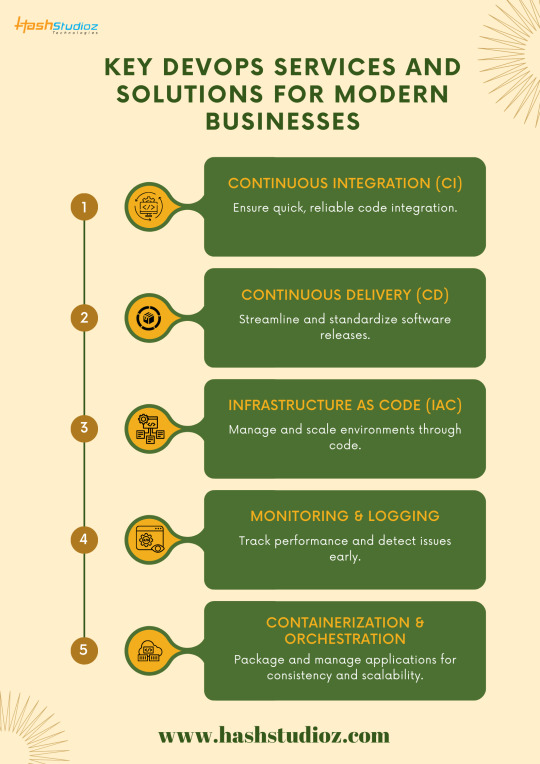
🔧 Key DevOps Services for Modern Businesses | Looking to boost your business efficiency? Discover essential DevOps services and solutions that can transform your operations and drive innovation.
#DevOps#BusinessGrowth#TechInnovation#TechStrategy#Hire DevOps Developers#Hire DevOps Engineer#Hire Dedicated DevOps Developers#Hire DevOps Specialist#DevOps Services and Solutions#DevOps Consulting Company#Best DevOps Consulting Company#DevOps Services#DevOps Consulting Services#DevOps Professional Services#DevOps Automation Services#DevOps Automation Services and Solutions#AWS Certified Devops Engineer#Devops Companies#AWS Devops Engineer
0 notes
Text
The Future of Jobs in IT: Which Skills You Should Learn.
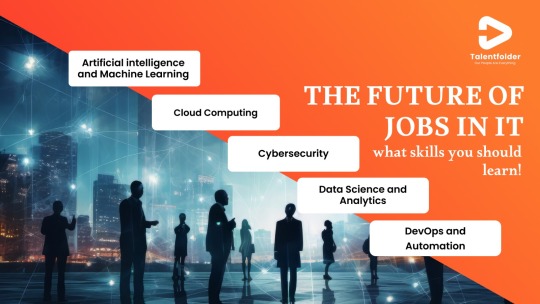
With changes in the industries due to technological changes, the demand for IT professionals will be in a constant evolution mode. New technologies such as automation, artificial intelligence, and cloud computing are increasingly being integrated into core business operations, which will soon make jobs in IT not just about coding but about mastering new technologies and developing versatile skills. Here, we cover what is waiting to take over the IT landscape and how you can prepare for this future.
1. Artificial Intelligence (AI) and Machine Learning (ML):
AI and ML are the things that are currently revolutionizing industries by making machines learn from data, automate processes, and predict outcomes. Thus, jobs for the future will be very much centered around these fields of AI and ML, and the professionals can expect to get work as AI engineers, data scientists, and automation specialists.
2. Cloud Computing:
With all operations now moving online, architects, developers, and security experts are in high demand for cloud work. It is very important to have skills on platforms such as AWS, Microsoft Azure, and Google Cloud for those who wish to work on cloud infrastructure and services.
3. Cybersecurity:
As dependence on digital mediums continues to increase, so must cybersecurity measures. Cybersecurity, ethical hacking, and network security would be skills everyone must use to protect data and systems from all the continuous threats.
4. Data Science and Analytics:
As they say, the new oil in this era is data. Therefore, organisations require professionals who would be able to analyze humongous datasets and infer actionable insights. Data science, data engineering, as well as advanced analytics tools, will be your cornucopia for thriving industries in the near future.
5. DevOps and Automation:
DevOps engineers are the ones who ensure that continuous integration and deployment work as smoothly and automatically as possible. Your knowledge of the business/operations will orient you well on that terrain, depending on how that applies to your needs.
Conclusion
IT job prospects rely heavily on AI, cloud computing, cybersecurity, and automation. It means that IT professionals must constantly innovate and update their skills to stay in competition. Whether an expert with years of experience or a newcomer, focusing on the following in-demand skills will gather success in this diverse land of IT evolution.
You might also like: How to crack interview in MNC IT
2 notes
·
View notes
Text
Navigating the DevOps Landscape: Opportunities and Roles
DevOps has become a game-changer in the quick-moving world of technology. This dynamic process, whose name is a combination of "Development" and "Operations," is revolutionising the way software is created, tested, and deployed. DevOps is a cultural shift that encourages cooperation, automation, and integration between development and IT operations teams, not merely a set of practises. The outcome? greater software delivery speed, dependability, and effectiveness.

In this comprehensive guide, we'll delve into the essence of DevOps, explore the key technologies that underpin its success, and uncover the vast array of job opportunities it offers. Whether you're an aspiring IT professional looking to enter the world of DevOps or an experienced practitioner seeking to enhance your skills, this blog will serve as your roadmap to mastering DevOps. So, let's embark on this enlightening journey into the realm of DevOps.
Key Technologies for DevOps:
Version Control Systems: DevOps teams rely heavily on robust version control systems such as Git and SVN. These systems are instrumental in managing and tracking changes in code and configurations, promoting collaboration and ensuring the integrity of the software development process.
Continuous Integration/Continuous Deployment (CI/CD): The heart of DevOps, CI/CD tools like Jenkins, Travis CI, and CircleCI drive the automation of critical processes. They orchestrate the building, testing, and deployment of code changes, enabling rapid, reliable, and consistent software releases.
Configuration Management: Tools like Ansible, Puppet, and Chef are the architects of automation in the DevOps landscape. They facilitate the automated provisioning and management of infrastructure and application configurations, ensuring consistency and efficiency.
Containerization: Docker and Kubernetes, the cornerstones of containerization, are pivotal in the DevOps toolkit. They empower the creation, deployment, and management of containers that encapsulate applications and their dependencies, simplifying deployment and scaling.
Orchestration: Docker Swarm and Amazon ECS take center stage in orchestrating and managing containerized applications at scale. They provide the control and coordination required to maintain the efficiency and reliability of containerized systems.
Monitoring and Logging: The observability of applications and systems is essential in the DevOps workflow. Monitoring and logging tools like the ELK Stack (Elasticsearch, Logstash, Kibana) and Prometheus are the eyes and ears of DevOps professionals, tracking performance, identifying issues, and optimizing system behavior.
Cloud Computing Platforms: AWS, Azure, and Google Cloud are the foundational pillars of cloud infrastructure in DevOps. They offer the infrastructure and services essential for creating and scaling cloud-based applications, facilitating the agility and flexibility required in modern software development.
Scripting and Coding: Proficiency in scripting languages such as Shell, Python, Ruby, and coding skills are invaluable assets for DevOps professionals. They empower the creation of automation scripts and tools, enabling customization and extensibility in the DevOps pipeline.
Collaboration and Communication Tools: Collaboration tools like Slack and Microsoft Teams enhance the communication and coordination among DevOps team members. They foster efficient collaboration and facilitate the exchange of ideas and information.
Infrastructure as Code (IaC): The concept of Infrastructure as Code, represented by tools like Terraform and AWS CloudFormation, is a pivotal practice in DevOps. It allows the definition and management of infrastructure using code, ensuring consistency and reproducibility, and enabling the rapid provisioning of resources.

Job Opportunities in DevOps:
DevOps Engineer: DevOps engineers are the architects of continuous integration and continuous deployment (CI/CD) pipelines. They meticulously design and maintain these pipelines to automate the deployment process, ensuring the rapid, reliable, and consistent release of software. Their responsibilities extend to optimizing the system's reliability, making them the backbone of seamless software delivery.
Release Manager: Release managers play a pivotal role in orchestrating the software release process. They carefully plan and schedule software releases, coordinating activities between development and IT teams. Their keen oversight ensures the smooth transition of software from development to production, enabling timely and successful releases.
Automation Architect: Automation architects are the visionaries behind the design and development of automation frameworks. These frameworks streamline deployment and monitoring processes, leveraging automation to enhance efficiency and reliability. They are the engineers of innovation, transforming manual tasks into automated wonders.
Cloud Engineer: Cloud engineers are the custodians of cloud infrastructure. They adeptly manage cloud resources, optimizing their performance and ensuring scalability. Their expertise lies in harnessing the power of cloud platforms like AWS, Azure, or Google Cloud to provide robust, flexible, and cost-effective solutions.
Site Reliability Engineer (SRE): SREs are the sentinels of system reliability. They focus on maintaining the system's resilience through efficient practices, continuous monitoring, and rapid incident response. Their vigilance ensures that applications and systems remain stable and performant, even in the face of challenges.
Security Engineer: Security engineers are the guardians of the DevOps pipeline. They integrate security measures seamlessly into the software development process, safeguarding it from potential threats and vulnerabilities. Their role is crucial in an era where security is paramount, ensuring that DevOps practices are fortified against breaches.
As DevOps continues to redefine the landscape of software development and deployment, gaining expertise in its core principles and technologies is a strategic career move. ACTE Technologies offers comprehensive DevOps training programs, led by industry experts who provide invaluable insights, real-world examples, and hands-on guidance. ACTE Technologies's DevOps training covers a wide range of essential concepts, practical exercises, and real-world applications. With a strong focus on certification preparation, ACTE Technologies ensures that you're well-prepared to excel in the world of DevOps. With their guidance, you can gain mastery over DevOps practices, enhance your skill set, and propel your career to new heights.
11 notes
·
View notes
Text
Journey to AWS Proficiency: Unveiling Core Services and Certification Paths
Amazon Web Services, often referred to as AWS, stands at the forefront of cloud technology and has revolutionized the way businesses and individuals leverage the power of the cloud. This blog serves as your comprehensive guide to understanding AWS, exploring its core services, and learning how to master this dynamic platform. From the fundamentals of cloud computing to the hands-on experience of AWS services, we'll cover it all. Additionally, we'll discuss the role of education and training, specifically highlighting the value of ACTE Technologies in nurturing your AWS skills, concluding with a mention of their AWS courses.

The Journey to AWS Proficiency:
1. Basics of Cloud Computing:
Getting Started: Before diving into AWS, it's crucial to understand the fundamentals of cloud computing. Begin by exploring the three primary service models: Infrastructure as a Service (IaaS), Platform as a Service (PaaS), and Software as a Service (SaaS). Gain a clear understanding of what cloud computing is and how it's transforming the IT landscape.
Key Concepts: Delve into the key concepts and advantages of cloud computing, such as scalability, flexibility, cost-effectiveness, and disaster recovery. Simultaneously, explore the potential challenges and drawbacks to get a comprehensive view of cloud technology.
2. AWS Core Services:
Elastic Compute Cloud (EC2): Start your AWS journey with Amazon EC2, which provides resizable compute capacity in the cloud. Learn how to create virtual servers, known as instances, and configure them to your specifications. Gain an understanding of the different instance types and how to deploy applications on EC2.
Simple Storage Service (S3): Explore Amazon S3, a secure and scalable storage service. Discover how to create buckets to store data and objects, configure permissions, and access data using a web interface or APIs.
Relational Database Service (RDS): Understand the importance of databases in cloud applications. Amazon RDS simplifies database management and maintenance. Learn how to set up, manage, and optimize RDS instances for your applications. Dive into database engines like MySQL, PostgreSQL, and more.
3. AWS Certification:
Certification Paths: AWS offers a range of certifications for cloud professionals, from foundational to professional levels. Consider enrolling in certification courses to validate your knowledge and expertise in AWS. AWS Certified Cloud Practitioner, AWS Certified Solutions Architect, and AWS Certified DevOps Engineer are some of the popular certifications to pursue.
Preparation: To prepare for AWS certifications, explore recommended study materials, practice exams, and official AWS training. ACTE Technologies, a reputable training institution, offers AWS certification training programs that can boost your confidence and readiness for the exams.
4. Hands-on Experience:
AWS Free Tier: Register for an AWS account and take advantage of the AWS Free Tier, which offers limited free access to various AWS services for 12 months. Practice creating instances, setting up S3 buckets, and exploring other services within the free tier. This hands-on experience is invaluable in gaining practical skills.
5. Online Courses and Tutorials:
Learning Platforms: Explore online learning platforms like Coursera, edX, Udemy, and LinkedIn Learning. These platforms offer a wide range of AWS courses taught by industry experts. They cover various AWS services, architecture, security, and best practices.
Official AWS Resources: AWS provides extensive online documentation, whitepapers, and tutorials. Their website is a goldmine of information for those looking to learn more about specific AWS services and how to use them effectively.
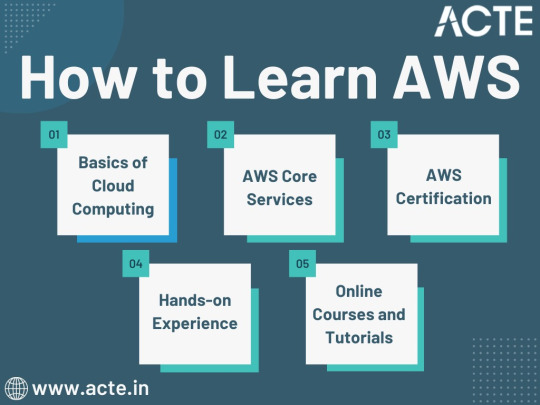
Amazon Web Services (AWS) represents an exciting frontier in the realm of cloud computing. As businesses and individuals increasingly rely on the cloud for innovation and scalability, AWS stands as a pivotal platform. The journey to AWS proficiency involves grasping fundamental cloud concepts, exploring core services, obtaining certifications, and acquiring practical experience. To expedite this process, online courses, tutorials, and structured training from renowned institutions like ACTE Technologies can be invaluable. ACTE Technologies' comprehensive AWS training programs provide hands-on experience, making your quest to master AWS more efficient and positioning you for a successful career in cloud technology.
8 notes
·
View notes
Text
Journey to Devops
The concept of “DevOps” has been gaining traction in the IT sector for a couple of years. It involves promoting teamwork and interaction, between software developers and IT operations groups to enhance the speed and reliability of software delivery. This strategy has become widely accepted as companies strive to provide software to meet customer needs and maintain an edge, in the industry. In this article we will explore the elements of becoming a DevOps Engineer.
Step 1: Get familiar with the basics of Software Development and IT Operations:
In order to pursue a career as a DevOps Engineer it is crucial to possess a grasp of software development and IT operations. Familiarity with programming languages like Python, Java, Ruby or PHP is essential. Additionally, having knowledge about operating systems, databases and networking is vital.
Step 2: Learn the principles of DevOps:
It is crucial to comprehend and apply the principles of DevOps. Automation, continuous integration, continuous deployment and continuous monitoring are aspects that need to be understood and implemented. It is vital to learn how these principles function and how to carry them out efficiently.
Step 3: Familiarize yourself with the DevOps toolchain:
Git: Git, a distributed version control system is extensively utilized by DevOps teams, for code repository management. It aids in monitoring code alterations facilitating collaboration, among team members and preserving a record of modifications made to the codebase.
Ansible: Ansible is an open source tool used for managing configurations deploying applications and automating tasks. It simplifies infrastructure management. Saves time when performing tasks.
Docker: Docker, on the other hand is a platform for containerization that allows DevOps engineers to bundle applications and dependencies into containers. This ensures consistency and compatibility across environments from development, to production.
Kubernetes: Kubernetes is an open-source container orchestration platform that helps manage and scale containers. It helps automate the deployment, scaling, and management of applications and micro-services.
Jenkins: Jenkins is an open-source automation server that helps automate the process of building, testing, and deploying software. It helps to automate repetitive tasks and improve the speed and efficiency of the software delivery process.
Nagios: Nagios is an open-source monitoring tool that helps us monitor the health and performance of our IT infrastructure. It also helps us to identify and resolve issues in real-time and ensure the high availability and reliability of IT systems as well.
Terraform: Terraform is an infrastructure as code (IAC) tool that helps manage and provision IT infrastructure. It helps us automate the process of provisioning and configuring IT resources and ensures consistency between development and production environments.
Step 4: Gain practical experience:
The best way to gain practical experience is by working on real projects and bootcamps. You can start by contributing to open-source projects or participating in coding challenges and hackathons. You can also attend workshops and online courses to improve your skills.
Step 5: Get certified:
Getting certified in DevOps can help you stand out from the crowd and showcase your expertise to various people. Some of the most popular certifications are:
Certified Kubernetes Administrator (CKA)
AWS Certified DevOps Engineer
Microsoft Certified: Azure DevOps Engineer Expert
AWS Certified Cloud Practitioner
Step 6: Build a strong professional network:
Networking is one of the most important parts of becoming a DevOps Engineer. You can join online communities, attend conferences, join webinars and connect with other professionals in the field. This will help you stay up-to-date with the latest developments and also help you find job opportunities and success.
Conclusion:
You can start your journey towards a successful career in DevOps. The most important thing is to be passionate about your work and continuously learn and improve your skills. With the right skills, experience, and network, you can achieve great success in this field and earn valuable experience.
2 notes
·
View notes
Text
AWS DevOps Careers: Navigating the Cloud-Infused Professional Landscape
In the rapidly evolving tech terrain, the confluence of AWS and DevOps has given rise to a dynamic realm, promising an array of career prospects. This all-encompassing guide unveils the diverse roles and responsibilities within AWS DevOps, offering insights into the multifaceted career avenues that await proficient individuals.
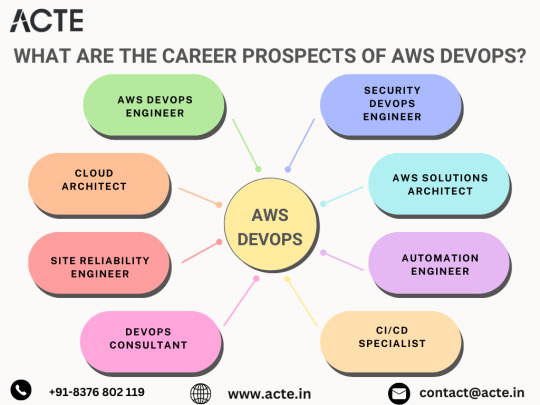
1. Crafting Cloud Solutions: The Role of an AWS DevOps Engineer
Overview: AWS DevOps Engineers serve as architects of automated software development, leveraging AWS cloud services.
Responsibilities: Dive into Infrastructure as Code (IaC), fine-tune AWS tools, and champion the principles of Continuous Integration/Continuous Deployment (CI/CD).
2. Architecting Scalable Cloud Solutions: The Realm of Cloud Architects
Overview: Cloud Architects design scalable and reliable cloud infrastructure on AWS, seamlessly aligning with DevOps principles.
Responsibilities: Collaborate to optimize AWS services, ensuring a resilient and scalable cloud environment.
3. Reliability in the Cloud: The Role of a Site Reliability Engineer (SRE)
Overview: SREs focus on ensuring system reliability, availability, and performance on AWS through vigilant monitoring and automation.
Responsibilities: Implement automation strategies, monitor AWS resources, and respond adeptly to incidents.
4. DevOps Consultancy: Guiding Organizations to DevOps Excellence
Overview: DevOps Consultants provide expertise in implementing DevOps practices, specializing in AWS services.
Responsibilities: Offer guidance on best practices, implement CI/CD pipelines, and optimize workflows using AWS tools.
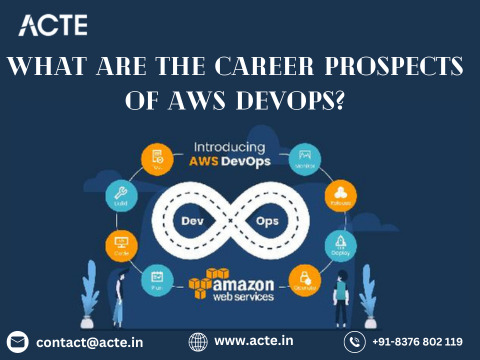
5. Embedding Security into DevOps: The Role of a Security DevOps Engineer (DevSecOps)
Overview: DevSecOps Engineers integrate security practices into the AWS DevOps pipeline.
Responsibilities: Implement robust security measures, conduct risk assessments, and ensure compliance with security policies.
6. Solutions Architecture on AWS: Crafting Business-Aligned Solutions
Overview: AWS Solutions Architects design and implement solutions aligned with business requirements, utilizing AWS services.
Responsibilities: Collaborate across teams, grasp project intricacies, and architect solutions that optimize AWS resources.
7. Scripting the Future: The Role of an Automation Engineer in AWS
Overview: Automation Engineers script and automate processes within AWS DevOps.
Responsibilities: Script infrastructure deployment, automate testing processes, and lead AWS automation initiatives.
8. Streamlining Software Delivery: The Role of a CI/CD Specialist on AWS
Overview: CI/CD Specialists optimize and streamline the software delivery pipeline within the AWS environment.
Responsibilities: Configure and manage CI/CD tools, ensuring the efficient and reliable delivery of software.
Embarking on an AWS DevOps career journey presents professionals with a landscape rich in challenges and opportunities. Each role within AWS DevOps contributes to a fulfilling and dynamic career trajectory, promising innovation and significant contributions to the ever-evolving technological realm. Best of luck as you navigate the transformative path of AWS DevOps careers!
2 notes
·
View notes